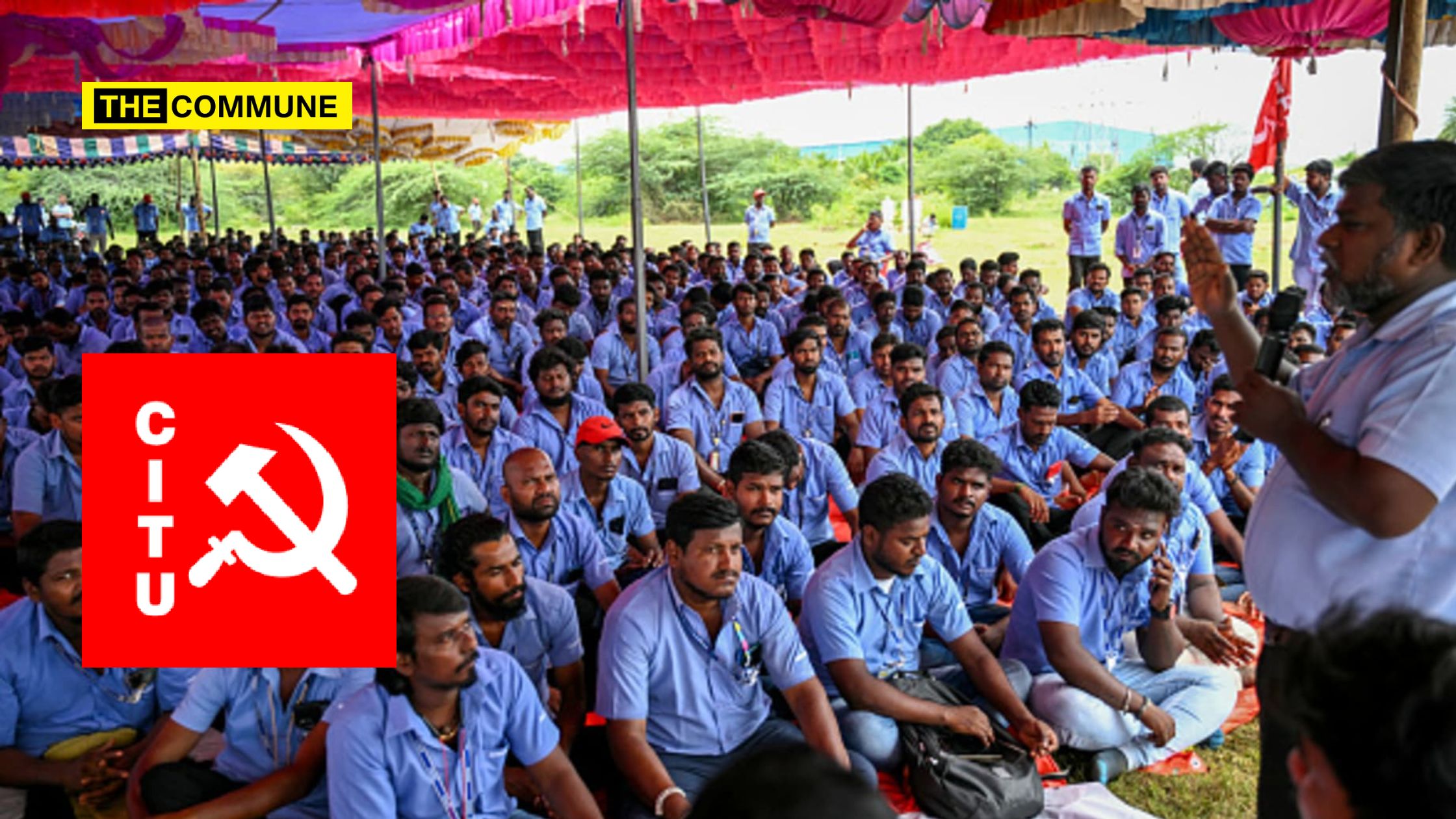
The ongoing strike at Samsung’s factory in Tamil Nadu is yet another example of how union-backed protests, especially those supported by Communist parties, can disrupt industrial operations in India. About 1,500 workers from the South Korean tech giant’s Chennai plant, one of Samsung’s two major factories in India, have halted production for weeks. The workers, represented by the newly formed Samsung India Labour Welfare Union (SILWU), are demanding better wages, improved working conditions, and, most importantly, formal recognition of their union.
This protest, which has seen daily gatherings of workers in Samsung uniforms, has led to significant production slowdowns, impacting the company’s ability to meet demand for consumer goods like air conditioners, refrigerators, and televisions. The Chennai plant contributes a substantial portion of Samsung’s $12 billion annual revenue in India, making the disruptions a costly affair.
The striking workers, supported by the Centre of Indian Trade Unions (CITU) – the labour wing of the Communist Party of India (Marxist) – are pushing for wage hikes, improved conditions, and union recognition. They argue that Samsung’s current wage of approximately ₹25,000 per month ($298) does not account for rising living costs. CITU has been vocal in accusing Samsung of mistreating workers by forcing them to meet unrealistic production targets and providing unsafe working conditions. While Samsung denies these allegations, the protests have escalated to the point where the company has had to rely on temporary workers to maintain minimal operations.
This isn’t the first time Communist-backed unions have disrupted international companies operating in India. These strikes raise concerns about India’s ability to retain foreign investment, particularly in manufacturing. Prime Minister Narendra Modi’s efforts to attract foreign manufacturers—positioning India as an alternative to China—are now at risk as these protests continue to generate negative publicity and disrupt business operations.
Fire Accidents At Factories In India
A fire at Tata Group’s Apple iPhone component plant in Hosur, Tamil Nadu, caused a production halt, affecting the supply of iPhone back panels and other parts for Foxconn and Tata’s iPhone assembly lines. The damage comes at a critical time, ahead of India’s festive season, potentially disrupting 10-15% of iPhone 14 and 15 sales in the country. Tata is the only Indian supplier of these components, and Apple may need to source parts from China to meet demand. Tata exported over $250 million worth of iPhones and components in the year leading up to August 2024. Although Apple reportedly has stock for eight weeks, the prolonged suspension could lead to shifting production back to China.
Some of the other incidents at factories in India in the recent past include:
- Fire incidents at Foxlink and Pegatron plants in India – led to brief operational halts in the past, with Foxlink’s facility lacking functional fire safety equipment.
- Labour unrest at the Wistron and Foxconn plants has affected production in India in recent years.
TN: INDI's Communist Party has stopped all work in Samsung plant and in the same time Mysterious fire burnt down Tata's iPhone plant. Now both companies are forced to restart production in China
Commies have done this numerous times in India to help CCPpic.twitter.com/oYBYLXiMkD
— Arun Pudur (@arunpudur) October 3, 2024
Impact Of Communist Labour Unions: Driving Business Away?
The strike at Samsung’s Chennai plant is reminiscent of the violent protests at the Wistron iPhone factory near Bengaluru in 2020. In that instance, employees protested against poor working conditions and wage delays. The disruption caused significant damage to the factory, leading to a temporary shutdown and production delays. In 2023, Wistron exited Apple India’s business.
Communist-backed unions justified these protests, which were costly not just for the company but also for India’s image as a stable manufacturing hub.
These events have raised alarms for multinational corporations looking to shift their production from China to India. Apple, one of the companies planning a large-scale move to India, experienced significant setbacks due to these protests. The Chinese government, alongside its state-run media, used the unrest as a propaganda tool to deter other businesses from leaving China. Reports from Chinese outlets highlighted how “unstable” labour conditions in India make it an unreliable destination for companies looking to diversify their supply chains away from China.
Could CITU’s Role Push Factories Back To China Or Other Countries?
CITU’s involvement in these labour disputes is part of a broader trend where Communist-backed unions seek dominance over factory operations, often leading to aggressive tactics that disrupt production. These disruptions don’t only hurt the companies involved but also damage India’s broader efforts to become a global manufacturing powerhouse.
Multinational corporations, including Apple and Samsung, have been moving some of their production lines to India to diversify away from China. However, the instability caused by union-backed protests might push these companies to reconsider their choices. Chinese propaganda channels have already leveraged these strikes to their advantage, portraying India as an unstable option for global manufacturing. Such narratives and the real financial losses caused by these strikes could deter companies from investing further in India or even prompt them to scale back their operations.
"India doesn't need manufacturing" fame Raghuram Raman is now TN govt advisor.
iPhone production move away from China has been a sore point for Chinese bosses. This is not the first time too. 1/2 pic.twitter.com/7G17L11Mzw
— Eminent Intellectual (@total_woke_) October 4, 2024
The Broader Picture: India’s Challenge
As India seeks to present itself as a viable alternative to China for global manufacturers, it faces significant challenges from within. The Samsung protests highlight a critical issue: the influence of politically backed unions, particularly those with Communist affiliations, which can cause long-term disruptions to foreign investment. While India offers a large, cost-effective workforce, protests such as these send mixed signals to foreign investors about the country’s ability to maintain stable industrial relations.
Communist unions had previously justified attacks on iPhone factory near Bengaluru. That too had a very high cost and Chinese propaganda accounts used it promptly to threaten other companies considering the move.
Nothing to see here guys. Just MOU at work. pic.twitter.com/8Cc4P36aXa
— Eminent Intellectual (@total_woke_) October 4, 2024
The Tamil Nadu government has attempted to mediate talks between the workers and Samsung, but progress has been slow. Meanwhile, CITU’s hardline stance suggests that the protest will continue until the union’s demands are met, adding further strain to the situation.
For foreign companies operating in India, the risk of strikes and labour disputes—exacerbated by the growing influence of Communist-backed unions—remains a significant concern. Without proper intervention and resolution, India could see more multinational corporations reconsider their plans to shift operations from China, undermining the country’s potential as a global manufacturing hub.
As the Samsung strike enters its fourth week, it’s clear that India faces an uphill battle in balancing the interests of foreign investors with the demands of local workers. If the country fails to address these labour issues swiftly, it may lose out on the foreign investment it has been courting so aggressively in recent years. Ultimately, the biggest beneficiaries of this unrest could be China (or other countries), which are watching India’s struggles with keen interest.
Subscribe to our Telegram, WhatsApp, and Instagram channels and get the best stories of the day delivered to you personally.




